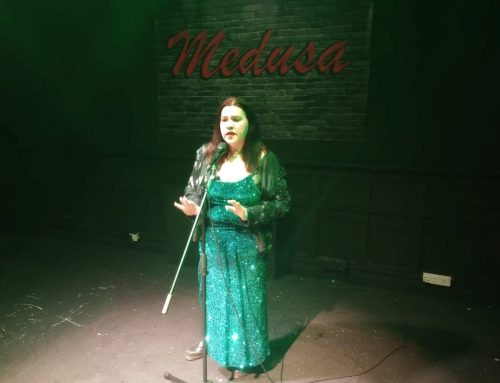Giulia Asquino and Delia Morea’s one-woman bioplay Love, Edith aims, so the show blurb tells us, to “retrace the decisive moments of Edith Piaf’s life and career”. It is a tough ask to pen an authentic dramatic profile of France’s greatest popular singer in 45 minutes. The seeds of a rounded believable depiction of “the brightest star France has ever had” are here but, anecdotally interesting though much of it is the work is, this feels very much like work-in-progress. Think character notes on a bigger, better work.
Piaf’s tale is told by the chanteuse herself in the suitably diminutive form of co-writer Asquino. Bedecked in a pencil-thin lacey black dress and frazzled flyaway hair she certainly looks the part of the singer dubbed ‘the little sparrow’. But one gets the feeling Asquino’s nuanced, even understated acting style would work better on the screen than the stage. Even in an intimate venue like the Golden Goose theatre it can be difficult to hear her. The performer makes a decent stab at the star’s tormented vibrato in the show’s pair of songs (one wishes there were more), but never quite captures the sparrow’s red-raw emotion and melodramatic tone.
The narrative mostly unfolds in dialogue between Piaf and the people important in her life. These include the grandmother in whose working bordello the singer grew up, her circus performer mother, the famous boxer lover who died young in a car crash, her manager, the songwriter to whom she became a muse, and a police officer with whom she suffers a menacing drunken encounter. Patron Saint Thérèse to whose framed painting Piaf offers up occasional confessions gets a look in too, as does Marlene Dietrich (“your voice is the soul of Paris” she is told), and the child Piaf bore and lost as a teenager.
Layered on top of the storytelling is a series of voiceovers in which Piaf’s ethereal spirit passes on sage life advice along the lines of “use your mistakes, use your flaws, and you will be a star” to a budding-but-timid modern-day cabaret singer. Opinions will vary as to how much this latter conceit adds to the mix, partly because it is never made clear what relationship the tempestuous young singer has with her ghostly predecessor. Elena Catangiu’s cream and crimson period set evokes a warm late-40s La Vie En Rose vibe. Steven Cox’s lighting sees the singer spend much of the time under a single spotlight, which feels right.
Writers: Giulia Asquino and Delia Morea
Director: Delia Morea
More Recent Reviews
Playfight. Soho Theatre.
Writer Julia Grogan’s breathtakingly assured debut play arrives at Soho Theatre following stellar reviews at the Edinburgh Fringe and [...]
All The Happy Things. Soho Theatre.
Naomi Denny’s three-hander comedy-drama All The Happy Things covers familiar themes within a recognisable premise. A grieving protagonist comes [...]
Telly. Bread and Roses Theatre.
The challenge with absurdist comedy is that many people do not find it funny. Laughing at the sheer weirdness [...]



